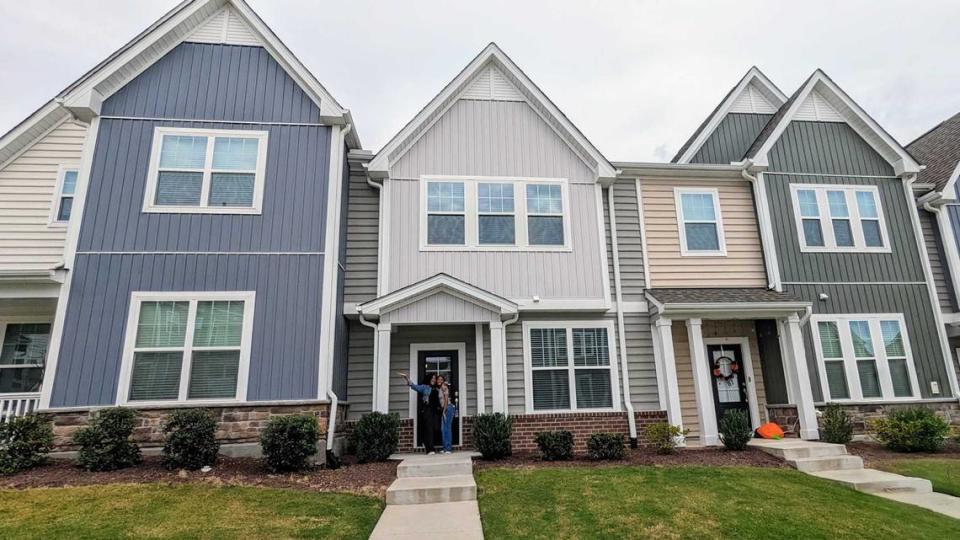How a single mother in Raleigh skipped traditional mortgage to step on property ladder
After four years of renting in North Raleigh, Desirae Lewis decided she’d had enough paying landlords.
She wanted a place to call her own. But as a first-time buyer and a single mother of three, she was daunted by the process and by the stiff competition. She also didn’t know if she could commit long-term.
That’s when her Realtor told her about Acre, a Durham-based co-ownership platform that launched in 2022 after landing seed funding from local investors like the Triangle Tweener Fund.
Acre’s model allows “buyers” to partner with cash investors. Instead of getting locked into a mortgage, they acquire a share of a home’s appreciation without having to purchase the entire home outright or take on big debt.
Billed as a better alternative to renting or a mortgage, it targets would-be buyers who might move in the next three to five years.
“It felt like a great stepping stone,” said Lewis, a medical assistant in a chiropractic clinic. “I’m not sure about where my final destination will be. Or what my forever home looks like. If life happens and I need to change locations, it’s a nice way to get my feet wet without the full commitment of having to resell.”
Acre is one of several alternative home-financing solutions to turn up in the area in recent years, promising to help families achieve the American dream amid inflation, high mortgage rates and home prices.
Others include Plum, a Durham-based platform offering “match-making” services to help connect co-buyers; and Ownify, a California-based fractional-ownership startup that allows buyers to buy their home “brick by brick”.
Unlike other fractional or rent-to-own options, Acre’s offering is slightly more nuanced, said CEO and co-founder Mike Schneider.
While Acre technically owns the home, it doesn’t “fractionalize” the home or divide it into parts, he said. In addition to giving people a share of a home’s increased value, it also covers closing and maintenance costs.
Some buyers may end up paying slightly more in monthly payments than a traditional mortgage. But on the plus side, they avoid other disadvantages -- like getting outbid by other buyers in a hot market, or a greater loss of equity in a market downturn.
“This is about the American homeowner where lifestyle has changed,” said Schneider, 36, whose first startup, First, a data science startup targeting realtors, was acquired in 2019 by real estate giant RE/MAX.
“We no longer live in our homes for 15 or 30 years. Our lives are much more mobile. We want the flexibility to move and upgrade. So we’ve created the perfect product for that.”

How it works
Acre purchases homes for its customers with an all-cash offer. In exchange, residents pay 5% of the home’s price to the company, earning a “value share” in the home’s appreciation.
Residents can choose between two plans: Acre Saver, a lower monthly payment and a 10% share of appreciation; or Acre Boost, the same monthly cost as a mortgage payment, but with a 50% appreciation share.
The monthly payment is fixed; and contracts typically last three to five years, he said.
Residents are allowed to make cosmetic upgrades, like painting walls and changing light fixtures, but major upgrades are approved on a “case-by-case” basis.
When a contract expires, residents have three options: purchase the home from Acre, transfer their share towardsanother Acre-approved home, or cash out their share, plus appreciation.
In the Lewis’ case, Acre purchased a three-bedroom, two-and-a-half bathroom townhouse in Raleigh’s Briar Creek suburb for $415,000 last October.
Lewis put down $20,750, which is 5% of the purchase price, based on Acre’s calculator. Depending on her plan, monthly payments are $2,956 with 10% appreciation or $3,251 with 50% appreciation. (Lewis declined to specify which plan she opted for.)
After three years, she will have earned in equity anywhere from $54,923 to $64,377, with a predicted 4% appreciation.
By contrast, a 30-year mortgage on a $415,000 house with a 20% down payment ($83,000) with today’s rates would be around $2,834 a month, NerdWallet estimates.
That’s about $122 to $417 less, respectively, than Acre’s payments.
Despite the monthly price difference, Lewis likes the deal.
“I love [my] screened-in porch. The house also has a study. My mom came over the last couple of weeks and stayed in there.” But she also realizes it’s not her “forever” home.
“I’d eventually like to get something that has four bedrooms and a full backyard; something we can be in a little bit more long term.”
‘Real estate match-making’: How 4 NC couples bought a house together (as strangers)
Is co-ownership right for you?
Mark Parker is a Realtor with Coldwell Banker in Raleigh, and a member of Raleigh Regional Association of Realtors.
He isn’t surprised by new mortgage products popping up as higher rates squeeze many would-be traditional buyers across the Triangle, he said.
He’s familiar with Acre and said there are a lot of upsides. While monthly payments may be on the “high side,” it helps first-time homeowners who might otherwise not be able to get into the market.
“If it doesn’t suit their needs in two to three years, they can walk away with no further obligation,” he said.
“It’s not for everyone,” added John Wood, owner of Re/Max United in Cary. “But there are buyers or renters that this program makes sense for.”
They and other Realtors also voice caution.
“It’s a convenience, and there’s no convenience which doesn’t come with a price,” said Derrick Thornton, a Realtor with Coldwell Banker Advantage out of Northeast Raleigh. “I would advise my clients to still run the numbers themselves to see if the program is a good fit.”
Nicco Crecco, a Broker with Red Collective |Compass in Durham, said buyers should also consult a real estate attorney to review contracts. “Buyers need to make sure they understand and are comfortable with the fine print.”

